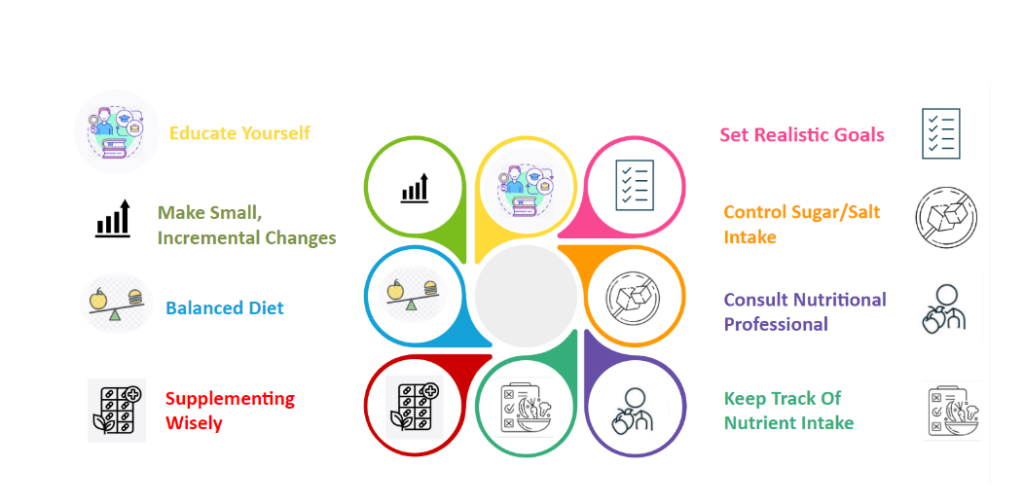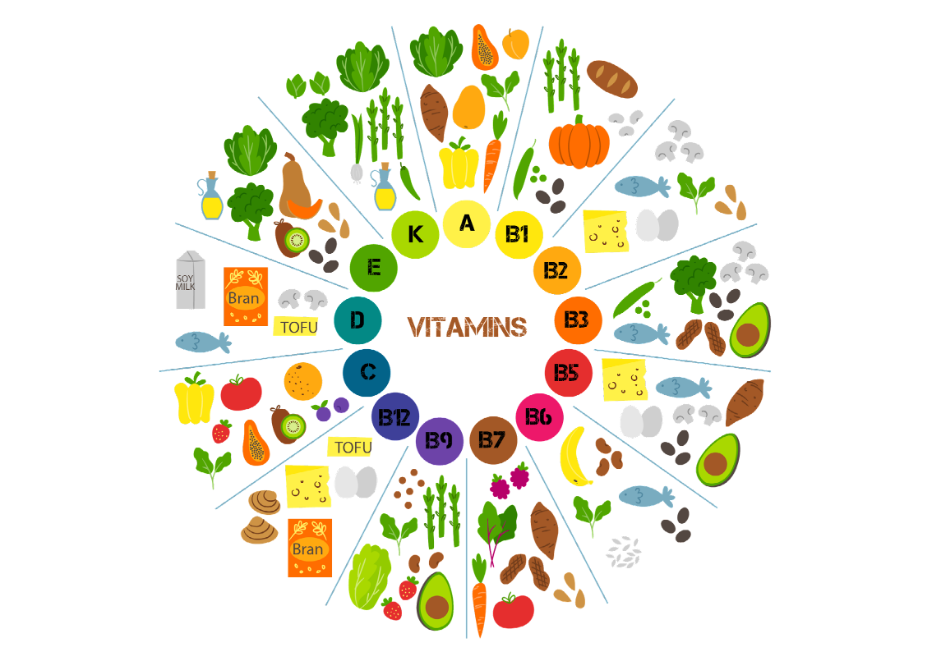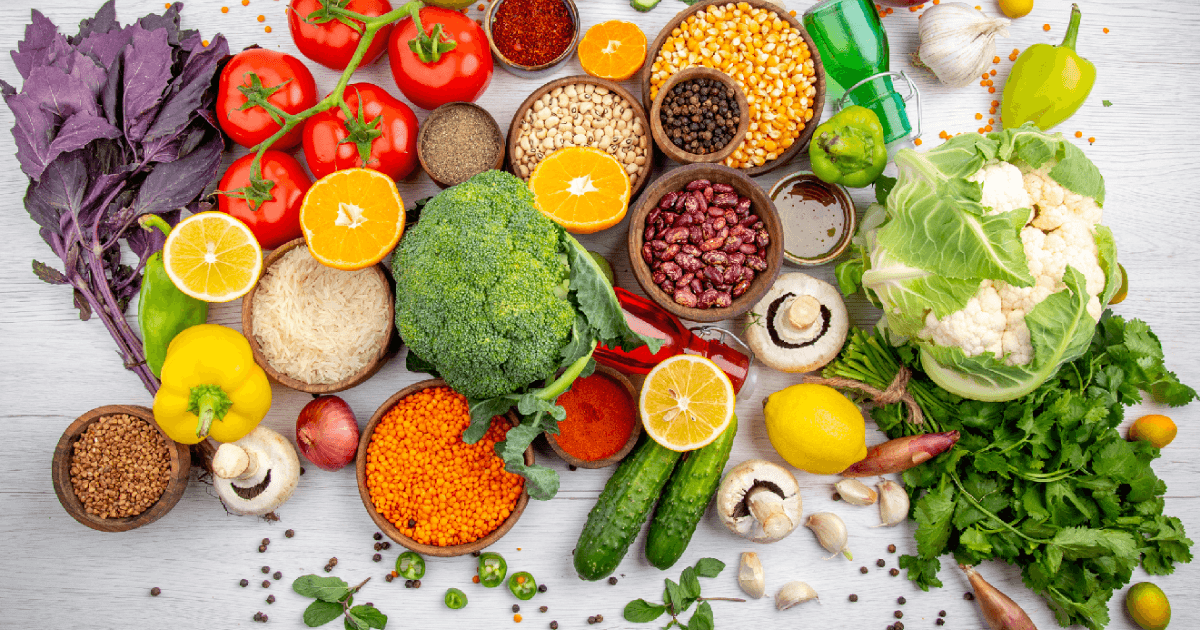The Vegetarian Indian diet is rich in flavours and boasts a variety of dishes that heavily rely on grains, pulses, vegetables, and dairy products. While this diet provides many essential nutrients, there are certain nutrient deficiencies that must be addressed to ensure a healthy and balanced diet. Understanding the nutritional shortcomings of a typical vegetarian Indian diet is crucial for maintaining optimal health and wellbeing. By identifying and addressing these deficiencies, it is possible to create a healthier and more balanced vegetarian Indian diet that supports overall health and longevity. In this article, we will explore the shortcomings of a vegetarian Indian diet and how to address them, including protein deficiency, balancing essential fatty acids, overcoming micronutrient deficiencies, ensuring adequate vitamin intake, incorporating whole grains and fibre for improved digestion, embracing variety, combining foods for optimal nutrient absorption, supplementing wisely, and consulting a nutrition expert.
Understanding the Nutritional Shortcomings of a Typical Vegetarian Indian Diet
Despite its numerous health advantages, a typical vegetarian Indian diet may lack certain nutrients that are essential for overall health and well-being. Common deficiencies include protein, calcium, iron, Omega-3 fatty acid and specific vitamins, such as vitamin B12 and vitamin D.
The Importance of Macronutrients and Micronutrients in a Vegetarian Indian Diet
Both macronutrients (protein, carbohydrates, and fats) and micronutrients (vitamins and minerals) play crucial roles in maintaining optimal health. Ensuring an adequate intake of essential nutrients is vital for energy production, immune function, growth, and overall well-being.
| Nutrient Type | Nutrient | Function |
|---|---|---|
| Macro Nutrients | 1. Carbohydrates | |
| Primary source of energy | ||
| Support brain function | ||
| Maintain digestive health | ||
| 2. Proteins | ||
| Support muscle growth and repair | ||
| Aid in tissue repair | ||
| Provide energy | ||
| Maintain immune function | ||
| 3. Fats | ||
| Secondary source of energy | ||
| Aid in hormone production | ||
| Support brain function | ||
| Maintain healthy skin and hair | ||
| Insulate and protect organs | ||
| Micro Nutrients | 1. Vitamins | |
| Facilitate energy production | ||
| Support immune system | ||
| Promote healthy skin, eyes, and hair | ||
| Assist in cell growth and repair | ||
| 2. Minerals | ||
| Maintain fluid balance | ||
| Support bone health | ||
| Facilitate nerve function | ||
| Enable enzyme and hormone function | ||
| Maintain proper muscle function |
Addressing Protein Deficiency: Ensuring Adequate Protein Intake
Protein is an essential macronutrient for proper body functioning and is necessary for building and repairing muscle, producing hormones, and producing enzymes. A common concern in vegetarian diets is the lack of adequate protein intake. Including a variety of protein-rich plant-based foods such as lentils, chickpeas, beans, soy products, and dairy can help vegetarians meet their daily protein requirements. Consuming a mix of complementary protein sources can ensure the intake of all essential amino acids. Additionally, incorporating protein-rich foods such as tempeh, tofu, and seitan can help to meet protein needs.
Calcium: Finding Alternative Sources Beyond Dairy
Calcium is a crucial nutrient for building and maintaining strong bones and teeth, and it is often associated with dairy products. However, for those following a vegetarian Indian diet, finding alternative sources of calcium beyond dairy is essential. Fortunately, there are several plant-based sources of calcium that can be easily incorporated into a vegetarian Indian diet.
Leafy green vegetables, such as spinach, kale, and collard greens, are excellent sources of calcium, as are other vegetables such as broccoli, okra, and bok choy. Additionally, some nuts and seeds, such as almonds and sesame seeds, are rich in calcium. Tofu, a popular vegetarian protein source, can also be an excellent source of calcium, particularly if it has been fortified. By incorporating these alternative sources of calcium into a vegetarian Indian diet, individuals can ensure they are meeting their calcium needs and supporting optimal bone health.
Addressing Iron and Zinc Deficiencies in a Vegetarian Indian Diet
Iron deficiencies are common in vegetarian diets due to the lower bioavailability of non-heme iron found in plant sources. To increase iron intake, consume iron-rich plant foods like spinach, legumes, nuts, seeds, and fortified cereals. Pairing these foods with vitamin C-rich foods, such as tomatoes, citrus fruits, or bell peppers, can enhance iron absorption.
Zinc can be found in whole grains, legumes, and nuts, while calcium is abundant in dairy products, green leafy vegetables, and fortified plant-based milk alternatives.
Balancing Essential Fatty Acids and Omega-6 Considerations
Essential fatty acids are important for maintaining good health, as they provide the building blocks for many important hormones and help to reduce inflammation. A vegetarian Indian diet may be low in omega-3 fatty acids while high in omega-6 fatty acids. To balance the intake of these essential fats, incorporate omega-3 rich foods like flaxseeds, chia seeds, walnuts, and algae-based supplements. Simultaneously, reduce the consumption of vegetable oils high in omega-6 fatty acids.
Fibre: Maximising Intake for Digestive Health and Disease Prevention
A vegetarian Indian diet is typically low in whole grains and fibre, as these are found primarily in processed grains and refined carbohydrates. To ensure adequate intake of whole grains and fibre, we should focus on eating foods such as oats, barley, brown rice, quinoa, whole wheat bread, and legumes. Additionally, incorporating foods such as fruits and vegetables can help to meet fibre needs.
A fibre-rich diet promotes digestive health and helps prevent chronic diseases. Incorporate whole grains, legumes, fruits, vegetables, nuts, and seeds into your meals to maximise fibre intake and support overall health. Whole grains like brown rice, whole wheat, and millets are packed with fibre, vitamins, and minerals. Including these in your diet can improve digestion, regulate blood sugar levels, and lower cholesterol.
Identifying Deficiencies and Solutions for Vitamin B12, D, and K
Vitamins are essential micronutrients that are necessary for proper body functioning. A vegetarian Indian diet can be low in certain vitamins, such as Vitamin B12, D and K.
Vitamin B12 is predominantly found in animal products, making it difficult for vegetarians to meet their daily requirements. Fortified foods, such as plant-based milk and breakfast cereals, or B12 supplements can help. Vitamin D is essential for calcium absorption, and exposure to sunlight, fortified foods, or supplements can be beneficial. Riboflavin is present in dairy products, fortified cereals, and certain vegetables like spinach and mushrooms.
Overcoming Barriers: Tips for Implementing Sustainable Changes in Your Vegetarian Indian Diet
Make sustainable changes to your diet by setting realistic goals, gradually incorporating new foods and habits, planning meals ahead, and seeking support from friends, family, or a nutrition professional.
Educate Yourself: Gain a thorough understanding of the nutritional requirements of a balanced vegetarian diet. Familiarise yourself with nutrient-rich food sources and the potential deficiencies in a typical vegetarian Indian diet to make informed food choices.
Be Mindful of Eating Habits: Cultivate mindfulness around your eating habits, paying attention to hunger cues and portion sizes. This can help prevent overeating and encourage healthier food choices.

Keep Track of Your Nutrient Intake: Monitor your food consumption to ensure you are meeting your nutritional needs. Use food diaries, smartphone apps, or consult with a nutrition expert to help you stay on track.
Set Realistic Goals: Establish achievable and sustainable dietary goals that focus on gradual changes, rather than attempting a complete overhaul of your diet overnight. Break down your goals into smaller steps to make the transition more manageable.
Embrace Flexibility: Understand that dietary changes are a continuous process, and setbacks may occur. Be open to adjusting your approach and remember that consistency is key to achieving sustainable changes.
Make Small, Incremental Changes: Implement dietary changes gradually to avoid overwhelming yourself. Start by incorporating new nutrient-rich foods or adjusting portion sizes, and progress from there.
Prepare Meals at Home: Cooking at home allows you to have better control over the ingredients used, portion sizes, and the nutritional balance of your meals. Experiment with new recipes and ingredients to diversify your diet and maintain interest in healthy eating.
Focus on Flavour and Enjoyment: Ensure that your meals are not only nutritionally balanced but also flavourful and enjoyable. Experiment with herbs, spices, and different cooking techniques to make healthy eating a pleasurable experience.
Maximising Nutrient Absorption through Food Pairings and Preparation Methods
Some nutrients are better absorbed when consumed together, such as iron and vitamin C or calcium and vitamin D. Combining foods strategically can optimise nutrient absorption and improve overall health.
Nutrient absorption is an important part of a healthy diet, as it ensures that the body is able to absorb and utilise the essential nutrients from the foods consumed. A vegetarian Indian diet can be low in certain nutrients, due to the lack of animal-based foods. To ensure optimal nutrient absorption, vegetarians should focus on combining different types of foods such as grains, legumes, nuts, seeds, and vegetables. Additionally, incorporating foods such as nuts and seeds with fruits and vegetables can help to increase nutrient absorption.
Enhance nutrient absorption by pairing foods that work synergistically, like combining iron-rich foods with vitamin C sources (e.g., spinach with lemon juice) or calcium-rich foods with vitamin D sources (e.g., fortified milk with sun exposure). Additionally, use preparation methods such as soaking, sprouting, or fermenting to improve the bioavailability of nutrients in plant-based foods.
Avoiding Excess: Managing Sugar and Salt Intake in Vegetarian Indian Diets
Vegetarian Indian diets can be high in sugar and salt, which can contribute to health issues. Limit added sugars by consuming whole fruits and using natural sweeteners, and reduce salt intake by using herbs, spices, and low-sodium alternatives to flavour meals.

Balancing the Plate: Creating Nutrient-Dense, Well-Balanced Vegetarian Indian Meals
To create well-balanced meals, divide your plate into sections: half for fruits and vegetables, a quarter for whole grains, and a quarter for protein-rich foods. This ensures a diverse range of nutrients and promotes overall health.
Supplementing Wisely: When and How to Use Dietary Supplements
Dietary supplements can be beneficial for those following a vegetarian Indian diet, as they can help to ensure adequate intake of certain nutrients. To ensure adequate intake of essential nutrients, vegetarians should focus on using dietary supplements wisely. This includes consulting with a nutrition expert to determine which supplements are necessary and taking supplements only as directed. Additionally, it is important to remember that dietary supplements should not replace a healthy and balanced diet. Consult with a healthcare professional before starting any supplementation to ensure the correct dosage and avoid potential adverse effects.
Consult a Nutrition Professional: Work with a registered dietitian or nutrition expert to create a personalised meal plan and receive guidance on overcoming barriers specific to your needs and lifestyle. Their expertise can help you navigate the challenges of implementing sustainable changes in your vegetarian Indian diet.
In conclusion, overcoming nutritional deficiencies in a typical Indian vegetarian diet is achievable by implementing a well-rounded approach. By ensuring adequate protein intake, balancing essential fatty acids, addressing micronutrient deficiencies, incorporating whole grains and fibre, and diversifying food choices, individuals can create a healthier and more balanced diet. By embracing variety and incorporating nutrient-dense foods, individuals can continue to enjoy the flavours and traditions of Indian cuisine while reaping the many health benefits of a well-planned vegetarian diet.
Furthermore, consulting a nutrition expert can provide personalised guidance and help create a well-rounded meal plan that supports optimal health and well-being, ensuring that the Indian vegetarian diet remains both nourishing and deeply rooted in tradition.
Composed by: “Varsha, proficient as a Business Analyst, has an educational foundation in healthcare IT, acquired through a PGDHM from IIHMR Delhi. Her primary interest rests at the intersection of healthcare and technology, with a specific focus on harnessing cutting-edge tech solutions to revolutionize patient care and enhance healthcare systems. Her work areas comprise optimizing healthcare data flow and improving operational efficiency, driving enhanced patient care and system robustness.”

